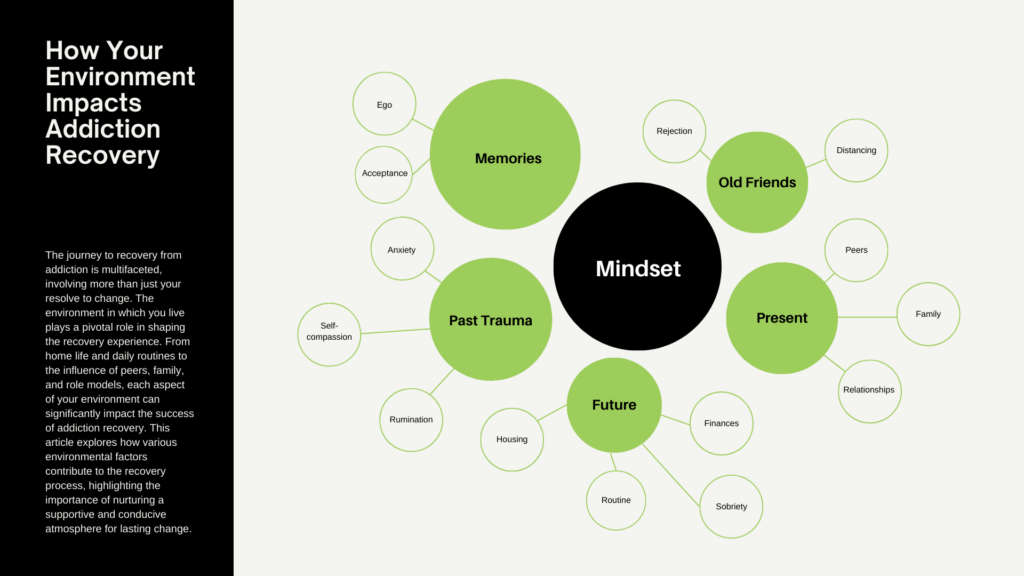Rachel and I have been talking, and we are actually thinking about going on the trip, just us two; you’ve been dragging us down lately with your negativity. The words hit Leann like a wall and sucked the breath out of her in that moment in reality. It was all too real. But it wasn’t like she was being negative; instead, she was keeping what she recently learned in rehab at the forefront of her mind. Meanwhile, her peers took this as a threat to their own identities. Leann’s path to sobriety was only two weeks past treatment, and her old drinking friends were already alienating her.
If you are reading this and thinking, “Why doesn’t she just move on?” Well, it’s not that easy. As humans, we seek out and crave social acceptance. While this may manifest differently from one person to the next, the desire to be accepted remains.
So, what does this have to do with how your environment impacts addiction recovery? Well, if you are like many people, it’s not as easy as one may think to uproot and leave everything behind after rehab. And, understandably so. Many post-rehabbers return to the same environment they were in before treatment, largely a result of financial constraints, and are met with judgment and alienation from their peers who continue to maintain the lifestyle they are working to evade.
The truth is, the journey to recovery from addiction is multifaceted, involving more than just your resolve to change. The environment in which you live plays a pivotal role in shaping the recovery experience. From home life and daily routines to the influence of peers, family, and role models, each aspect of your environment can significantly impact the success of addiction recovery. This article explores how various environmental factors contribute to the recovery process, highlighting the importance of nurturing a supportive and conducive atmosphere for lasting change.

Foundations of Recovery: Building Supportive Personal and Social Environments
For some people, these factors listed below may seem obvious; even so, it can be helpful to see them all in an organized fashion as it is often the fundamental, foundational aspects that, when practiced consistently over time, make the most significant impact on shaping change.
Home Life and Its Influence:
- Stable and Supportive Home Environment: A peaceful, stable home provides the tranquility necessary for recovery. Chaotic or stressful living conditions can trigger relapses. Ensuring a living space that promotes calmness and stability is vital.
- Removal of Substances: Keeping the home free from substances prone to abuse or temptation is crucial. The presence of these substances can tempt even the most resolved individuals, making their removal an essential step in creating a recovery-friendly home. Being in the presence of these substances and feeling tempted to indulge does not make you weak or a failure; try to view it as the beginning of the next stage of your life.
Routine and Daily Structure:
- Structured Daily Routine: Establishing a routine, including set times for meals, exercise, work or activities, and relaxation, can provide a sense of order and purpose, reducing the risk of relapse.
- Incorporating Healthy Activities: Engaging in healthy activities like exercise, hobbies, or volunteering can fill the time previously occupied by substance use, offering a positive outlet for stress and a source of fulfillment.
Peer Influence:
- Supportive Social Circle: Surrounding oneself with friends who support your recovery journey is critical. Peer groups that encourage substance use can hinder recovery efforts and may need to be avoided.
- Recovery Groups and Meetings: Participating in support groups or recovery meetings provides a network of individuals who understand the challenges of addiction and can offer support and guidance.
Family Impact:
- Family Support and Understanding: The support and understanding of family members can be a significant source of strength in recovery. Family therapy and open communication can help repair relationships damaged by addiction.
- Setting Boundaries: Establishing healthy boundaries with family members, especially those who may not be supportive of recovery efforts, is essential for maintaining focus on one’s well-being.
Influences and Role Models:
- Positive Role Models: Having role models who have successfully navigated the recovery process can inspire and motivate individuals in their journey. These role models can offer practical advice and a living example of a life free from addiction.
- Media and Online Influence: It’s essential to be mindful of media consumption. Surrounding oneself with positive and uplifting content can reinforce recovery goals, while exposure to substance-glorifying media can undermine them.
Environmental and Social Factors in Addiction Recovery
Community Environment
- Local Community Resources: Access to local resources such as community centers, libraries, and recreational facilities can provide safe spaces for learning, relaxation, and social interaction outside the home.
- Community Support Programs: Participating in community-driven support programs and activities can foster a sense of belonging and provide additional layers of support and accountability.
Cultural and Societal Influences:
- Cultural Attitudes towards Recovery: Cultural perceptions and stigmas surrounding addiction and recovery can significantly impact one’s recovery journey. Engaging with cultural groups that support recovery can be empowering.
- Public Awareness and Education: Societal understanding and public awareness campaigns about addiction can help reduce stigma and create a more supportive environment for those in recovery.
Physical Environment and Lifestyle:
- Access to Nature and Green Spaces: Regular access to natural environments, like parks or beaches, can promote mental health, reduce stress, and provide a serene setting for contemplation and exercise.
- Healthy Lifestyle Choices: Adopting a healthy lifestyle, including diet, exercise, and leisure activities, is crucial in maintaining physical and mental well-being during recovery.
Employment and Career Development:
- Supportive Work Environment: A workplace that understands and supports an employee’s journey through recovery can significantly reduce stress and aid in maintaining sobriety.
- Career Development Opportunities: Engaging in meaningful work and having opportunities for career growth can enhance self-esteem and provide a sense of purpose, which is vital for long-term recovery.
Education and Personal Development:
- Continued Education and Skill Building: Education or skill-building courses can provide a constructive focus and a sense of achievement, aiding personal growth and recovery.
- Personal Development Workshops: Workshops focusing on personal development, such as stress management, communication skills, and emotional intelligence, can equip individuals with tools to handle challenges in a more healthy manner.
Incorporating Technology in Recovery:
- Digital Tools and Apps: Utilizing digital tools like recovery tracking apps, online counseling, and educational platforms can provide additional support and resources for managing addiction.
- Social Media and Online Communities: Engaging with positive online communities and social media groups focused on recovery can offer encouragement and a sense of connection with others who share similar experiences.
Your Recovery Starts Today!
Call for Immediate Assistance1-888-546-6005
Challenges in the Environment Affecting Addiction Recovery
How your environment impacts addiction recovery extends beyond external factors and also demands internal mindset shifts.
Desire for Acceptance and Fitting In:
- Peer Pressure in Social Circles: The desire to be accepted, especially in social circles or peer groups, can lead individuals to behave contrary to their recovery goals. This pressure is often subtle and may manifest as joining in activities where substance use is prevalent just to feel included.
- Workplace Culture and Social Events: In many workplace environments, social events involving alcohol or other substances can create a dilemma for those in recovery, where abstaining might feel isolating or detrimental to one’s social standing in the office.
Family Dynamics and Expectations:
- Coping with Family Expectations: Family members may have expectations or traditions that inadvertently pressure someone in recovery. For instance, drinking during family gatherings can be a significant challenge for someone trying to maintain sobriety.
- Navigating Relationship Changes: As individuals change during recovery, relationships within the family may also shift, sometimes leading to misunderstandings or feelings of alienation.
Cultural Norms and Societal Views:
- Challenging Cultural Norms: In many cultures, substance use is normalized in social settings, making it difficult for individuals in recovery to avoid these environments without feeling ostracized.
- Stigma Attached to Addiction and Recovery: Societal stigma around addiction can make individuals hesitant to seek help or openly discuss their recovery for fear of being judged or misunderstood.
Media Influence and Portrayal of Substance Use:
- Glamorization of Substance Use: Media often glamorizes alcohol and drug use, portraying it as a normal or desirable aspect of social life, which can create internal conflict for those in recovery.
- Social Media and Comparison: Social media platforms can expose individuals to peer lifestyles that may include substance use, leading to feelings of missing out or the temptation to revert to old habits to feel a part of the group.
Overcoming Environmental Challenges:
- Developing Strong Personal Boundaries: Learning to set and maintain personal boundaries is crucial in navigating environments where substance use is prevalent.
- Seeking Alternative Social Groups: Finding social groups and activities that align with sober living can provide a sense of belonging without the pressure to engage in substance use.
- Educating and Communicating with Peers and Family: Open communication about recovery challenges can help educate peers and family members, fostering a more supportive environment.
- Cultivating Self-Acceptance: Building self-esteem and self-acceptance is key to overcoming the need for external validation reducing the impact of peer pressure and societal norms.
- Professional Support and Counseling: Engaging in regular counseling or support groups can provide strategies and support for dealing with environmental pressures and challenges.
How Your Environment Impacts Addiction Recovery: Recap
The environment significantly impacts addiction recovery, as seen in Leann’s story where her journey to sobriety is challenged by old friends who misunderstand her new mindset. This scenario highlights the struggle many face post-rehab: returning to familiar environments that don’t support their recovery journey. Recovery is a multifaceted process, influenced by home life, daily routines, peer and family relationships, and broader societal factors. A stable, substance-free home environment, structured routines, and engaging in healthy activities are foundational. Supportive social circles, including recovery groups and understanding family members, are vital. Role models and positive media influence also play a role, as do community resources and supportive work environments. Education and personal development further aid recovery.
However, challenges like peer pressure, cultural norms, and societal views can create hurdles. The desire for acceptance can lead to compromising recovery goals, and navigating family dynamics and societal stigma adds complexity. Overcoming these challenges involves setting personal boundaries, seeking alternative social groups, open communication, self-acceptance, and professional support. Ultimately, the journey to recovery is influenced by both personal resolve and the environment, underscoring the importance of creating a supportive atmosphere for lasting change.
By addressing these often-overlooked environmental challenges, individuals in recovery can be better equipped to maintain their sobriety and make choices that support their long-term wellness goals.
Begin your journey to sobriety today, whether it’s through our free drug and alcohol rehab directory or elsewhere, we wish you the best in your journey to the best version of yourself.







